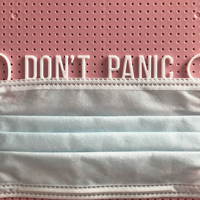How to Deal with Excessive Worry and Uncertainty
April 14, 2020

Easter is here and it has been a bit more than a month of quarantine for many of us. This time of uncertainty brings much higher levels of stress, anxiety, and loneliness than we usually experience. We’re all trying to do what we can to flatten that famous curve while trying to stay sane and adapting to a lifestyle that hopefully won’t last that long.
Here are some proven techniques if you cannot stop worrying and ruminating.
Schedule 5 to 15 minutes every day to worry. Instead of being consumed by worrying the entire day, giving yourself an allotted time can make worrying less of destructive influence. When you realize you’re thinking about something outside those 15 minutes, remind yourself it’s not time to worry yet. When you reach the scheduled worry time, sit down and worry. By using this trick you’re confining your worries to one small chunk of time rather than allowing them to dominate your mood the entire day. Our brains are designed to worry about dangerous situations which makes worrying a normal response to the abnormal situation we’re in. Try not to beat yourself up for worrying. Be kind to yourself and give yourself the grace and permission to worry productively.
Another trick is distracting yourself when you feel the worrying thoughts taking over. Brainstorm and write down a couple of activities that you enjoy and that you can do while in quarantine (we’re thinking put on a favorite beat and start dancing in your living room, go for that run and get some fresh air, get creative or bake something). When you feel that the thoughts are becoming too overwhelming start doing one of those already planned activities. If you’re looking for inspiration on what to do here’s a massive list of activities, entertainment and learning resources that will keep you busy.
How do I deal with the uncertainty of the current situation?
Our brain is constantly looking for certainty as one of its main jobs is to protect us from any outside threats. Uncertainty, however, is a part of life. We can’t run away from it so we better learn to navigate it with a compassionate mindset. We don’t know for how long the world will be in some form of lockdown and the consequences of this pandemic are not in the control of any individual. What we know from research is that controlling what we actually can control helps us feel better.
So make sure you do the things that are within your control at moment such as getting enough sleep, limiting intake of news and mindless scrolling, hand washing, social distancing, staying fit and eating well.
Empower yourself by asking “how” questions instead of “what” questions. Try shifting from “what will happen if..” to “how can I best prepare for…”, “how can I maintain an optimistic outlook…” and “how can I take care of myself in these times”. Switching to how questions empower you to take action over things you can control!
Another technique you can try if you’re stuck in fearful thought loops about uncertainty is to be alert and notice the fear-based thoughts you’re having and to write them down.
Don’t respond, instead try to sit with your thoughts, let them be there for a while. Observe and notice them without judging yourself for having them.
Let go of the thoughts, it could look something like this: “My need for certainty is unnecessary…uncertainty is just a part of life…I’ll just let my need for certainty go, and accept uncertainty.” Try to visualize your need for certainty floating past in clouds or in the sea and tell yourself that you choose to let go of your need for certainty.
Stay present-focused, focus on what you’re feeling in the moment, focus on your breath if you need an anchor and go back to what you can control.
Catch the wandering mind. Your mind will inevitably wander off again and again when it does instead of engaging with it try telling yourself. “Ah, my mind has wandered back to needing certainty. That’s ok. I’ll just bring my attention back to the present. Back to noticing my breathing…” and back to doing things that are actually helpful for me.
By: Charlotte Ekström & Kelli Raymond, psychologists in training and counselors at Student Counseling Center, Webster Private University Vienna.